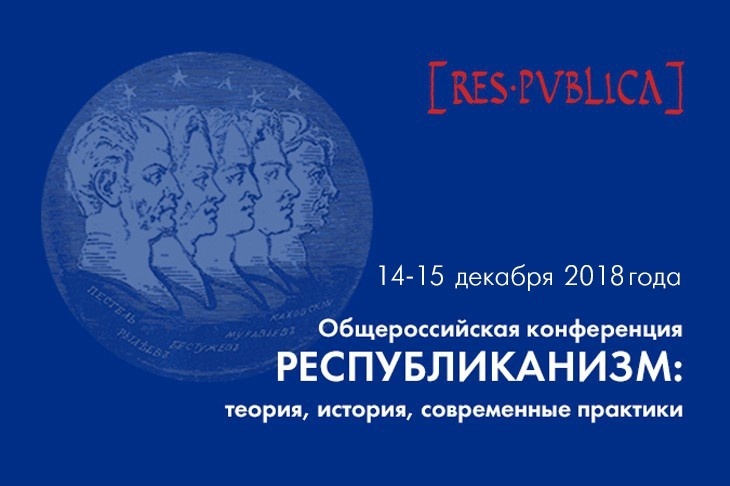
The Res Publica Research Center held its second “Republicanism: Theory, History, Modern Practices” conference on December 14 - 15, 2018. Researchers of theory and history of the classical republican tradition and republican experience in various historical epochs participated in the conference.
The conference involved two discussion formats this year:
- panel sessions: “Historic specifics of the practice of political deliberation in Russia”, “Aspects of the modern theory of republicanism”, “Ecclesia et Res Publica”, “Republican practices in contemporary Russia”, “The Decembrist movement and classical republican tradition in Russia: the Decembrist myth from the perspective of intellectual history ";
- roundtables: "Republicanism and liberalism", "Alexander Radishchev and European Republicanism in Russia in the 18th Century”.
This year's program was peculiar in that it was more oriented towards the Russian experience of thinking and speaking about republican common affairs.
Day one started with a roundtable discussion of the relationship between republicanism and liberalism. Oleg Kharkhordin talked about the origin of the opposition between these theories of freedom and civil society, but, as the author noted, any discussion on this matter collides with the problem of defining republicanism, whose single meaning simply does not exist. Alexander Etkind introduced ecology as a new variable in the comparative analysis of republicanism and liberalism. According to him, climate change engenders a new political paradox, whose resolution will fall upon the shoulders of the green Leviathan that has yet to be formed. Andrei Zorin suggested an alternative system of distinction in his speech. He addressed the issue of the republican tradition's loss of the idea of a deal and the ensuing significance of valiant and virtuous behavior for supporters of the theory of freedom as non-dominance. Grigory Yudin responded thoroughly to the main question of the roundtable in his concluding speech. In his opinion, republicanism is no different from liberalism in today's Russia. Grigory noted their common "sore spots" arising from the negative definition of freedom, and focused on their different understandings of sovereignty.
Participants of the second session presented their papers on the historic specifics of the practice of political deliberation in Russia. Natalia Potapova presented the results of her research, in which Catherine the Great's Legislative Commission is conceptualized in the theoretical framework of the deliberative model, and proposed a number of Russian-language alternatives to the concept of deliberation. Alexander Savrasov conducted a comparative analysis of the practice of debate in the State Duma of 1906-1917 and in our days. Daria Dimke dwelled on the problem of public aphasia in Russia as the inability to agree on resolving issues of common good and speech strategies resorted to by participants of public debates.
Alexander Finiarel, Elizaveta Zakharova, Vladislav Demidkin and Anastasia Ashaeva spoke at the final session of day one. Their papers addressed matters of Wittgenstein's influence on Philip Pettit's freedom as non-dominance, peculiar features of the republicanism of English "rural" conservatives, as well as ways of perceiving ancient republicanism in the American political discourse. Elizaveta Zakharova presented the Russian translation of the first volume of Jean Bodin's "Les Six livres de la République".
The second day of the conference began with a roundtable discussion of Alexander Radishchev and European republicanism in Russia in the 18th century. Andrei Kostin, Andrei Zorin and Artemy Magun participated in the discussion.
The next session shifted the republican issues into the fashion of theological tradition. Andrei Shishkov presented his analysis of the “republic of autocephalous churches” as a model of the structure of the Orthodox Church. Oleg Kharkhordin introduced his study on the theology of icons, which examines the mechanism of the structure of non-representative political institutions. Yevgenii Lyutko shared his observations on the formation of church, state and republican subjectivity in Russia at the turn of the 18th-19th centuries.
Oleg Pachenkov, Evgenii Roshchin and Mikhail Sokolov delivered their papers focusing on republican practices in contemporary Russia. Oleg Pachenkov applied Hannah Arendt's concept of Vita Activa to the study of urban activism/urbanism, while the two other presenters addressed the problem of academic freedoms and the transformation of the internal policy of universities in the post-Soviet space. Evgenii Roshchin suggested that the very idea of university regulation is destructive rather than the persecution of individual representatives of the academia. Mikhail Sokolov demonstrated research data on changes in corporate management regimes at universities.
The final session of the conference was devoted to the Decembrist movement and the classical republican tradition in Russia. Victor Kaplun presented arguments in defense of the thesis that in certain cases Yuri Lotman was forced to adjust empirical data to predefined conceptual schemes, without noticing that, and engaging in controversy with himself. In continuation of reflections about Lotman and the “mistakes of the great minds”, Mikhail Velizhev unwinded the story about "Lotman’s brilliant mistake” made in the article “The Decembrist in Everyday Life”, and Maria Mayofis presented her arguments that would explain the political situation linked to the transformation of the “Union of Salvation” into the “Union of Prosperity”. William Rosenberg also shared his thoughts as the panel discussant.
In his closing remarks at the end of the conference Georges Nivat talked about Solzhenitsyn, republics and the algorithm of revolutions.
Anna Novoseltseva